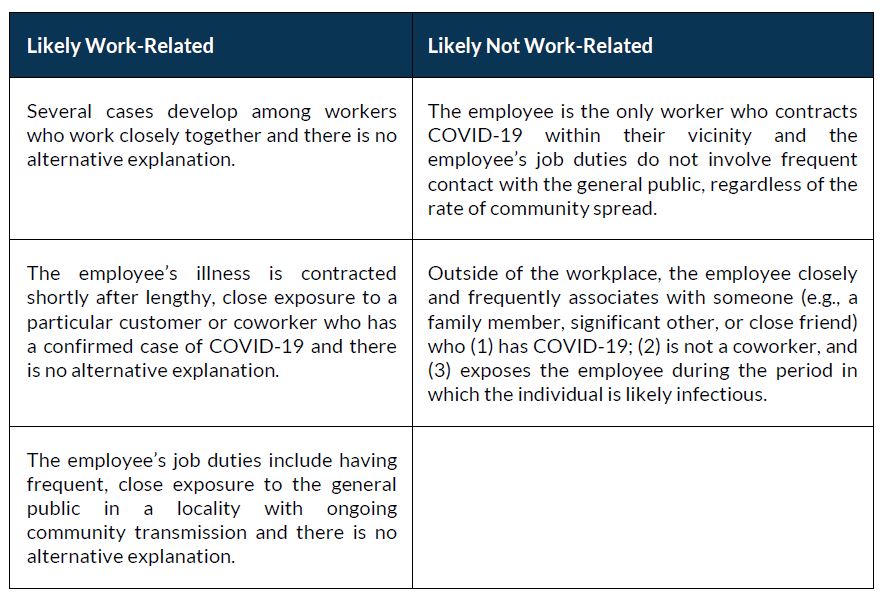COVID-19 Illnesses Now OSHA-Recordable Under Agency Shift
The Occupational Safety and Health Administration (OSHA) has issued new guidance requiring all employers to evaluate confirmed cases of COVID-19 for work-relatedness and to record those cases that are determined to be work-related under OSHA recordkeeping requirements.
The new guidance, which takes effect May 26, 2020, is a dramatic shift from guidance issued by OSHA on April 10, which limited the recording of COVID-19 illnesses to employers in healthcare, emergency response, and correctional institutions. The May 20 guidance supersedes the April 10 guidance and will require all employers that are covered by OSHA’s recordkeeping standard to record cases of work-related COVID-19 cases. Employers with ten or fewer employees and certain employers in low hazard industries have no new recordkeeping obligations; they need only report work-related COVID-19 illnesses that result in a fatality or an employee’s in-patient hospitalization, amputation, or loss of an eye.
The May 26 guidance states that an employer is responsible for recording a case of COVID-19 under the following circumstances:
- The employee has a confirmed case of COVID-19 as defined by the Centers for Disease Control and Prevention;
- The case is work-related under existing OSHA regulations; and
- The case involves “one or more of the general recording criteria” in OSHA’s reporting and recordkeeping regulations.
Under OSHA’s recordkeeping standard, an employer must treat an injury or illness as meeting the agency’s general recording criteria, and as therefore recordable, if it results in any of the following: death, lost time from work, restricted work or transfer to another job, medical treatment beyond first aid, or loss of consciousness. An employer must also consider a case to be recordable if it involves a significant injury or illness that has been diagnosed by a physician or other licensed health care professional, even if it does not result in death, days away from work, restricted work or job transfer, medical treatment beyond first aid, or loss of consciousness.
OSHA acknowledges that the work-relatedness determination will be challenging for employers given the proliferation of community-based infections and offers guidelines to assist employers in gathering information to make the work-relatedness determination. OSHA has stated that when an employer learns of an employee’s COVID-19 illness, it is sufficient to:
- Ask the employee how they believe that they contracted the illness;
- While respecting the employee’s privacy, discuss with the employee any out-of-work activities that may have led to the COVID-19 illness; and
- Review the employee’s work environment for potential sources of exposure, including other instances of employees in the same environment contracting COVID-19.
OSHA has identified the following factors as relevant to the work-relatedness determination:

In addition to the above factors, employers are advised to give weight to any evidence of causation provided by the employee’s health care provider, public health departments, and the employee themselves.
An employer is responsible for taking into consideration all evidence available to it at the time of the determination. If, at a later date, new information comes to the employer’s attention, the employer should also consider that new information and potentially revise its work-relatedness determination. If, despite a reasonable and good faith inquiry, the employer is not able to determine causation, then the employer does not need to record the illness.
The May 26 guidance is not permanent and is only expected to be in place during the current health crisis. Franczek will continue to monitor the OSHA website for developments and provide updates.